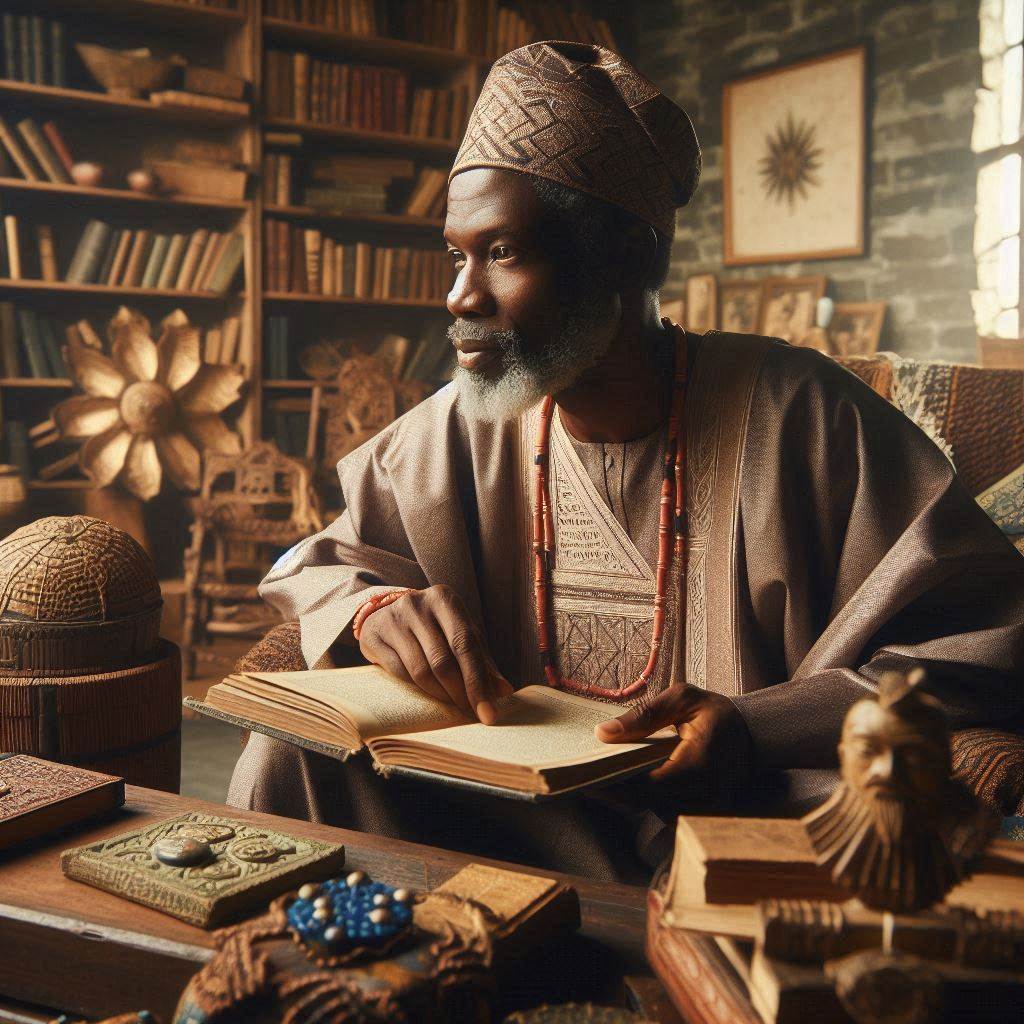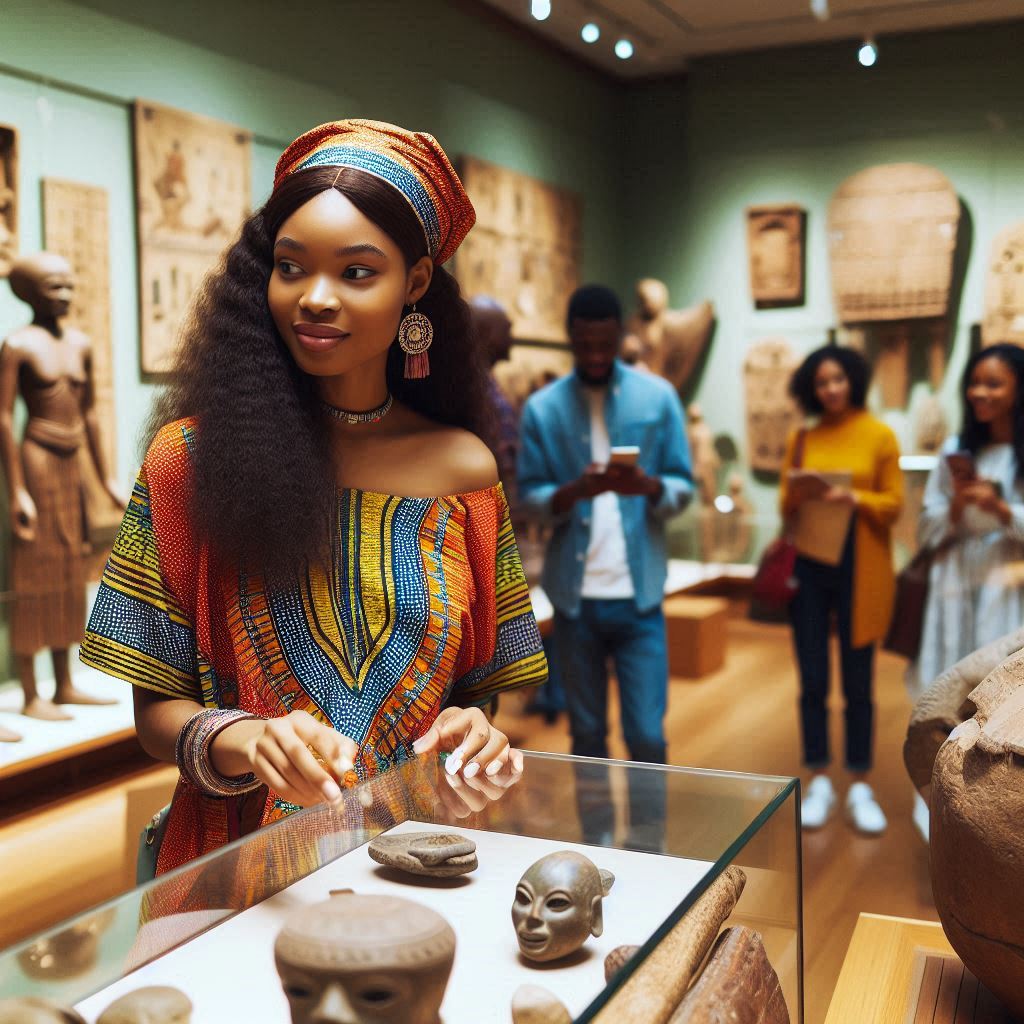Introduction
Defining History and Strategic Studies
History examines past events, people, and societies. It uncovers how our world has evolved over time.
Strategic Studies, on the other hand, focuses on analyzing and developing strategies for security and defense. It aims to understand conflict, peace, and power dynamics globally.
Importance of Studying History and Strategic Studies in Contemporary Nigeria
Studying these subjects is crucial for Nigeria today. Here’s why:
- Learning from the Past: History teaches us about our roots, triumphs, and mistakes.
- Building National Identity: Understanding history fosters a sense of identity and unity.
- Informed Decision-Making: Strategic Studies equips leaders with tools for making sound, informed decisions.
Relevance of These Disciplines in Shaping National Policies and Decisions
History and Strategic Studies play pivotal roles in policy-making. Here’s how they influence national strategies:
- Preventing Past Mistakes: Policymakers learn from historical errors to avoid repeating them.
- Crafting Effective Policies: Strategic Studies offers frameworks for creating robust national policies.
- Enhancing Security: Strategic insights strengthen national defense and security measures.
- Fostering International Relations: Historical and strategic knowledge aids in navigating global diplomacy.
Generally, History and Strategic Studies are vital for Nigeria’s progress. They shape policies, enhance security, and foster national unity. By understanding our past and strategizing for the future, we pave the way for a better Nigeria.
Evolution of History and Strategic Studies in Nigeria
Origins of History and Strategic Studies Education in Nigeria
Since gaining independence in 1960, Nigeria has placed great importance on the study of history and strategic studies. The roots of these disciplines can be traced back to the early days of the country’s academic institutions.
Historically, the study of history in Nigeria was influenced by European colonialism. British colonizers introduced Western education, including history, in the late 19th century.
Initially, history education was focused on European perspectives and narratives.
It wasn’t until Nigeria gained independence that efforts were made to decolonize the curriculum and incorporate indigenous histories and perspectives. This marked a significant shift in the evolution of history education in the country.
On the other hand, strategic studies, as a distinct field of study, began to gain prominence in Nigeria in the mid-20th century.
With the increasing complexities of global politics and international relations, the importance of strategic thinking and analysis became evident.
Development and Growth of History and Strategic Studies in Academia
In the post-independence era, Nigerian universities started to offer history as a standalone discipline. This allowed students to delve deeper into the rich cultural heritage, traditions, and historical events that shaped the nation.
As the demand for strategic thinkers and analysts grew, universities began to introduce programs in strategic studies.
These programs focused on equipping students with the necessary skills to analyze geopolitical trends, formulate policies, and develop strategic initiatives.
Over the years, the curriculum for both history and strategic studies has evolved to reflect contemporary issues and global trends. Emphasis is now placed on interdisciplinary approaches, critical thinking, and research skills.
Today, history and strategic studies departments in Nigerian universities are thriving hubs of academic excellence.
Students have access to state-of-the-art resources, expert faculty members, and research opportunities that enhance their understanding of past events and future challenges.
Key Institutions and Individuals in the Advancement of History and Strategic Studies
Several institutions and individuals have played pivotal roles in shaping the landscape of history and strategic studies education in Nigeria. Some of the key contributors include:
- University of Ibadan: Known for its strong history department and research facilities, the University of Ibadan has been a frontrunner in promoting historical studies in Nigeria.
- Nigerian Institute of International Affairs (NIIA): As a premier think tank focused on international relations, the NIIA has been instrumental in advancing strategic studies and providing policy recommendations.
- Prof. J.F. Ade Ajayi: A renowned historian and former Vice-Chancellor of the University of Lagos, Prof. Ade Ajayi made significant contributions to the study of Nigerian history and mentored generations of historians.
- Prof. Bolaji Akinyemi: A respected figure in the field of international relations, Prof. Akinyemi has promoted strategic thinking and diplomacy in Nigeria through his research, writings, and public engagements.
Therefore, the evolution of history and strategic studies in Nigeria reflects the country’s commitment to academic excellence, indigenous knowledge, and global perspectives.
As these disciplines continue to grow, they will play a crucial role in shaping Nigeria’s future and fostering a deeper understanding of its past.
Read: Student Experiences: Life in Communication Arts
Key Areas of Focus in History and Strategic Studies in Nigeria
Exploring the Various Subfields within History and Strategic Studies
History and Strategic Studies encompass diverse subfields that delve into specific aspects of human experiences and strategic planning. Some key subfields include:
Subfields in History
- Political History: This subfield examines the evolution of political systems, governance, and political movements.
- Economic History: It focuses on the development of economies, trade practices, and economic policies over time.
- Social History: This area studies societal changes, cultural practices, and the everyday lives of people.
- Military History: It looks at past conflicts, wars, military strategies, and their impacts on societies.
- Cultural History: This subfield explores cultural developments, traditions, and the influence of culture on history.
Subfields in Strategic Studies
- Defense Policy: This area analyzes national defense strategies and military policies.
- Security Studies: It examines threats to national security and strategies for mitigating them.
- Geopolitics: This subfield studies the effects of geography on international politics and relations.
- Conflict Resolution: It focuses on methods and strategies for resolving conflicts peacefully.
- Intelligence Studies: This area deals with the gathering and analysis of information for strategic purposes.
Importance of Studying Nigerian History and Strategic Issues
Studying Nigerian history and strategic issues is crucial for understanding the nation’s past and shaping its future. Here are some key reasons:
- Preserving Heritage: Nigerian history helps preserve the cultural and historical heritage of diverse ethnic groups.
- Understanding Conflict: Historical studies shed light on past conflicts, aiding in conflict resolution and peace-building.
- Informed Governance: Knowledge of history and strategic issues informs better governance and policymaking.
- National Unity: Understanding the nation’s history fosters a sense of unity and shared identity among Nigerians.
- Economic Planning: Historical economic data provides insights for contemporary economic planning and development.
Current Research Trends and Areas of Interest in the Discipline
Contemporary research in History and Strategic Studies in Nigeria focuses on several dynamic areas:
- Post-Colonial Studies: Researchers analyze the impacts of colonialism on Nigeria’s development and identity.
- Conflict and Peace Studies: There is a significant focus on understanding and resolving ongoing conflicts within the country.
- Environmental History: Scholars explore the historical relationship between Nigerians and their environment.
- Digital History: The use of digital tools to study and present historical data is gaining traction.
- Counterterrorism: Strategic studies heavily focus on combating terrorism and enhancing national security.
The study of History and Strategic Studies in Nigeria is multifaceted and vital. By exploring various subfields, we gain comprehensive insights into our past and present.
Understanding Nigerian history and strategic issues is essential for informed governance, conflict resolution, and national development.
Current research trends continue to evolve, addressing contemporary challenges and contributing to a deeper understanding of Nigeria’s historical and strategic landscape. This dynamic field remains crucial in shaping Nigeria’s future.
Read: Communication Arts: Balancing Theory and Practice
Role of History and Strategic Studies in shaping national identity
The study of history plays a crucial role in shaping national identity in Nigeria. This is evident through the preservation and promotion of Nigerian culture and heritage.
Preservation of Nigerian Culture
- History provides a rich tapestry of Nigeria’s past, showcasing the diverse cultures and traditions that make up the nation.
- By studying history, Nigerians are able to understand and appreciate the customs and practices that have been passed down through generations.
- Historical events, such as the pre-colonial kingdoms and empires, help to foster a sense of pride and connection to Nigeria’s heritage.
- Through the study of history, Nigerian youth can learn about the struggles and triumphs of their ancestors, inspiring a sense of national identity.
Promotion of Nigerian Heritage
- Historical landmarks and sites serve as important symbols of Nigeria’s past, allowing for the preservation of cultural heritage.
- Museums and cultural institutions play a vital role in promoting Nigerian heritage by showcasing artifacts and artworks from different eras.
- Traditional festivals and ceremonies, rooted in history, provide a platform for celebrating Nigeria’s diverse cultural heritage.
- The study of history encourages Nigerians to embrace their unique traditions and values, promoting a sense of national pride.
On the other hand, strategic studies contribute significantly to national security and defense policies in Nigeria. This discipline involves the analysis of threats and opportunities, as well as the formulation of strategies to address them.
Contribution to National Security
- Strategic studies enable policymakers to assess potential risks and challenges facing Nigeria, from internal conflicts to external threats.
- By understanding the strategic environment, Nigerian leaders can develop effective defense policies and allocate resources appropriately.
- The study of strategy helps to coordinate military, diplomatic, and intelligence efforts to safeguard national security interests.
- Through strategic studies, Nigeria can enhance its capabilities to counter terrorism, piracy, and other security threats.
Influence of Historical Narratives
- Historical narratives play a significant role in shaping contemporary issues in Nigeria, influencing policies and public discourse.
- The past informs the present, as events like the colonial era and civil war continue to impact political and social dynamics.
- By studying historical narratives, Nigerians can gain insights into the origins of current challenges and opportunities for development.
- Historical lessons provide valuable guidance for navigating complex issues such as ethnic tensions, corruption, and governance in Nigeria.
In essence, the role of history and strategic studies in shaping national identity in Nigeria cannot be overstated.
From preserving cultural heritage to informing national security policies, these disciplines play a crucial role in shaping the destiny of the nation.
Through a deep understanding of history and strategic thinking, Nigeria can navigate the challenges of the present and build a prosperous future for its citizens.
Read: How to Apply for Communication Arts Programs

Challenges Facing History and Strategic Studies in Nigeria
As valuable as History and Strategic Studies are in understanding the past and shaping the future, they face various challenges in Nigeria that hinder their growth and development. Below are some of the major obstacles:
Limited Funding
The lack of financial resources allocated to these disciplines hampers research efforts, publication of academic works, and the overall advancement of knowledge in history and strategic studies.
Inadequate Infrastructure
The absence of well-equipped libraries, archives, and research facilities significantly limits the ability of historians and strategic analysts to conduct in-depth studies and produce quality research outcomes.
Insufficient Academic Programs
There is a shortage of specialized academic programs focusing on History and Strategic Studies in many Nigerian universities, leading to a scarcity of qualified professionals in these fields.
Lack of Professional Recognition
History and Strategic Studies are often undervalued in academia and government, resulting in limited job opportunities, low salaries, and a lack of incentives for scholars and researchers in these disciplines.
Limited Access to Information
The restricted access to historical documents, archival materials, and strategic information poses a significant challenge for researchers and educators in Nigeria, limiting the scope and depth of their studies.
Deprioritization in Education Policies
History and Strategic Studies are sometimes neglected in national education policies, leading to a lack of emphasis on these disciplines in school curricula and academic programs, thereby diminishing their relevance and importance.
Dearth of Research Opportunities
The limited opportunities for conducting research, publishing findings, and collaborating with other scholars hinder the growth and impact of History and Strategic Studies in Nigeria, restricting the academic discourse in these fields.
Lack of Institutional Support
Many academic institutions do not provide sufficient support and resources for history and strategic studies departments, impeding the development of innovative teaching methods, research projects, and academic initiatives.
Inadequate Government Commitment
The government’s failure to prioritize and invest in the development of history and strategic studies as crucial disciplines for national development hampers the progress and evolution of these fields in Nigeria.
In general, addressing these challenges and overcoming the obstacles facing History and Strategic Studies in Nigeria requires a concerted effort from all stakeholders, including government agencies, academic institutions, funding bodies, and the wider research community.
By recognizing the significance of these disciplines, providing adequate resources and support, and fostering a culture of intellectual inquiry and academic excellence.
Nigeria can enhance the study and practice of history and strategic studies, contributing to a more informed, strategic, and prosperous society.
Read: Famous Nigerian Alumni of Communication Arts Programs
Opportunities for growth and development in History and Strategic Studies
Potential collaborations and partnerships with international institutions
Collaborating with international institutions can provide new perspectives and opportunities for research.
Technology and digital resources can facilitate data collection, analysis, and dissemination of research findings.
Interdisciplinary studies allow for a holistic approach to complex issues, leading to innovative solutions.
Partnerships with other fields such as political science, sociology, and economics can enrich research in history and strategic studies.
Transform Your Career with Expert Guidance
Get personalized mentorship consulting that’s tailored to your unique path. Our expert advice is actionable and exclusive.
Get StartedEngaging in collaborative projects with scholars from diverse backgrounds can enhance academic rigor and foster a culture of knowledge sharing.
Utilizing online platforms and databases can expand access to research materials, enabling scholars to conduct more comprehensive studies.
Participating in conferences and workshops can promote networking opportunities and knowledge exchange among researchers and practitioners.
The role of technology and digital resources in advancing research and scholarship in these disciplines
Embracing emerging technologies like artificial intelligence and big data analytics can revolutionize the methodologies used in historical research.
Developing strong research skills through continuous training and workshops can enhance the quality of scholarship in history and strategic studies.
The importance of interdisciplinary studies and connections with other fields for growth
Encouraging students to pursue interdisciplinary studies can equip them with a broad skill set that is essential for success in the field.
Supporting research initiatives that focus on contemporary issues can address pressing societal challenges and contribute to national development.
Investing in research infrastructure and resources can create a conducive environment for cutting-edge research in history and strategic studies.
Establishing partnerships with government agencies and non-profit organizations can provide funding opportunities for research projects in these disciplines.
Engaging with policymakers and stakeholders can ensure that research findings are relevant and impactful in shaping public policies and strategies.
Conclusion
In closing, the history and strategic studies in contemporary Nigeria provide crucial insights into the country’s development.
The discussions highlighted the importance of understanding Nigeria’s past to shape its future.
Investing in education in these disciplines is essential for informed decision-making and strategic planning.
Further research and exploration in history and strategic studies can contribute significantly to Nigeria’s progress.
By delving deeper into these areas, policymakers and scholars can gain a better understanding of Nigeria’s challenges and opportunities.
Ultimately, continued investment in history and strategic studies is vital for Nigeria’s sustainable growth and development.
It is recommended that more resources be allocated to research and education in these fields to equip future generations with the knowledge needed to lead the country forward.
By promoting a deeper understanding of Nigeria’s history and strategic imperatives, the nation can chart a course towards a more prosperous and stable future.




